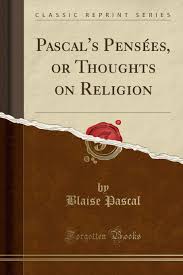Pensées Page #2
The Pensées is a collection of fragments on theology and philosophy written by 17th-century philosopher and mathematician Blaise Pascal. Pascal's religious conversion led him into a life of asceticism, and the Pensées was in many ways his life's work. The Pensées represented Pascal's defense of the Christian religion.
From that time until his death, Pascal was closely associated with the society of Port-Royal which his sister Jacqueline, who predeceased him, had joined as a religieuse; the society was then fighting for its life against the Jesuits. Five propositions, judged by a committee of cardinals and theologians at Rome to be heretical, were found to be put forward in the work of Jansenius; and the society of Port-Royal, the representative of Jansenism among devotional communities, suffered a blow from which it never revived. It is not the place here to review the bitter controversy and conflict; the best account, from the point of view of a critic of genius who took no side, who was neither Jansenist nor Jesuit, Christian nor infidel, is that in the great book of Sainte-Beuve, Port-Royal. And in this book the parts devoted to Pascal himself are among the most brilliant pages of criticism that Sainte-Beuve ever wrote. It is sufficient to notice that the next occupation of Pascal, after his conversion, was to write these eighteen "Letters," which as prose are of capital importance in the foundation of French classical style, and which as polemic are surpassed by none, not by Demosthenes, or Cicero, or Swift. They have the limitation of all polemic and forensic: they persuade, they seduce, they are unfair. But it is also unfair to assert that, in these Letters to a Provincial, Pascal was attacking the Society of Jesus in itself. He was attacking rather a particular school of casuistry which relaxed the requirements of the Confessional; a school which certainly flourished amongst the Society of Jesus at that time, and of which the Spaniards Escobar and Molina are the most eminent authorities. He undoubtedly abused the art of quotation, as a polemical writer can hardly help but do; but there were abuses for him to abuse; and he did the job thoroughly. His Letters must not be called theology. Academic theology was not a department in which Pascal was versed; when necessary, the fathers of Port-Royal came to his aid. The Letters are the work of one of the finest mathematical minds of any time, and of a man of the world who addressed, not theologians, but the world in general--all of the cultivated and many of the less cultivated of the French laity; and with this public they made an astonishing success. During this time Pascal never wholly abandoned his scientific interests. Though in his religious writings he composed slowly and painfully, and revised often, in matters of mathematics his mind seemed to move with consummate natural ease and grace. Discoveries and inventions sprang from his brain without effort; among the minor devices of this later period, the first omnibus service in Paris is said to owe its origin to his inventiveness. But rapidly failing health, and absorption in the great work he had in mind, left him little time and energy during the last two years of his life. The plan of what we call the Pensées formed itself about 1660. The completed book was to have been a carefully constructed defence of Christianity, a true Apology and a kind of Grammar of Assent, setting forth the reasons which will convince the intellect. As I have indicated before, Pascal was not a theologian, and on dogmatic theology had recourse to his spiritual advisers. Nor was he indeed a systematic philosopher. He was a man with an immense genius for science, and at the same time a natural psychologist and moralist. As he was a great literary artist, his book would have been also his own spiritual autobiography; his style, free from all diminishing idiosyncrasies, was yet very personal. Above all, he was a man of strong passions; and his intellectual passion for truth was reinforced by his passionate dissatisfaction with human life unless a spiritual explanation could be found. We must regard the Pensées as merely the first notes for a work which he left far from completion; we have, in Sainte-Beuve's words, a tower of which the stones have been laid on each other, but not cemented, and the structure unfinished. In early years his memory had been amazingly retentive of anything that he wished to remember; and had it not been impaired by increasing illness and pain, he probably would not have been obliged to set down these notes at all. But taking the book as it is left to us, we still find that it occupies a unique place in the history of French literature and in the history of religious meditation. To understand the method which Pascal employs, the reader must be prepared to follow the process of the mind of the intelligent believer. The Christian thinker--and I mean the man who is trying consciously and conscientiously to explain to himself the sequence which culminated in faith, rather than the public apologist--proceeds by rejection and elimination. He finds the world to be so and so; he finds its character inexplicable by any non-religious theory; among religions he finds Christianity, and Catholic Christianity, to account most satisfactorily for the world and especially for the moral world within; and thus, by what Newman calls "powerful and concurrent" reasons, he finds himself inexorably committed to the dogma of the Incarnation. To the unbeliever, this method seems disingenuous and perverse; for the unbeliever is, as a rule, not so greatly troubled to explain the world to himself, nor so greatly distressed by its disorder; nor is he generally concerned (in modern terms) to "preserve values." He does not consider that if certain emotional states, certain developments of character, and what in the highest sense can be called "saintliness" are inherently and by inspection known to be good, then the satisfactory explanation of the world must be an explanation which will admit the "reality" of these values. Nor does he consider such reasoning admissible; he would, so to speak, trim his values according to his cloth, because to him such values are of no great value. The unbeliever starts from the other end, and as likely as not with the question: Is a case of human parthenogenesis credible? and this he would call going straight to the heart of the matter. Now Pascal's method is, on the whole, the method natural and right for the Christian; and the opposite method is that taken by Voltaire. It is worth while to remember that Voltaire, in his attempt to refute Pascal, has given once and for all the type of such refutation; and that later opponents of Pascal's Apology for the Christian Faith have contributed little beyond psychological irrelevancies. For Voltaire has presented, better than any one since, what is the unbelieving point of view; and in the end we must all choose for ourselves between one point of view and another.
Translation
Translate and read this book in other languages:
Select another language:
- - Select -
- 简体中文 (Chinese - Simplified)
- 繁體中文 (Chinese - Traditional)
- Español (Spanish)
- Esperanto (Esperanto)
- 日本語 (Japanese)
- Português (Portuguese)
- Deutsch (German)
- العربية (Arabic)
- Français (French)
- Русский (Russian)
- ಕನ್ನಡ (Kannada)
- 한국어 (Korean)
- עברית (Hebrew)
- Gaeilge (Irish)
- Українська (Ukrainian)
- اردو (Urdu)
- Magyar (Hungarian)
- मानक हिन्दी (Hindi)
- Indonesia (Indonesian)
- Italiano (Italian)
- தமிழ் (Tamil)
- Türkçe (Turkish)
- తెలుగు (Telugu)
- ภาษาไทย (Thai)
- Tiếng Việt (Vietnamese)
- Čeština (Czech)
- Polski (Polish)
- Bahasa Indonesia (Indonesian)
- Românește (Romanian)
- Nederlands (Dutch)
- Ελληνικά (Greek)
- Latinum (Latin)
- Svenska (Swedish)
- Dansk (Danish)
- Suomi (Finnish)
- فارسی (Persian)
- ייִדיש (Yiddish)
- հայերեն (Armenian)
- Norsk (Norwegian)
- English (English)
Citation
Use the citation below to add this book to your bibliography:
Style:MLAChicagoAPA
"Pensées Books." Literature.com. STANDS4 LLC, 2025. Web. 30 Jan. 2025. <https://www.literature.com/book/pens%C3%A9es_114>.








Discuss this Pensées book with the community:
Report Comment
We're doing our best to make sure our content is useful, accurate and safe.
If by any chance you spot an inappropriate comment while navigating through our website please use this form to let us know, and we'll take care of it shortly.
Attachment
You need to be logged in to favorite.
Log In